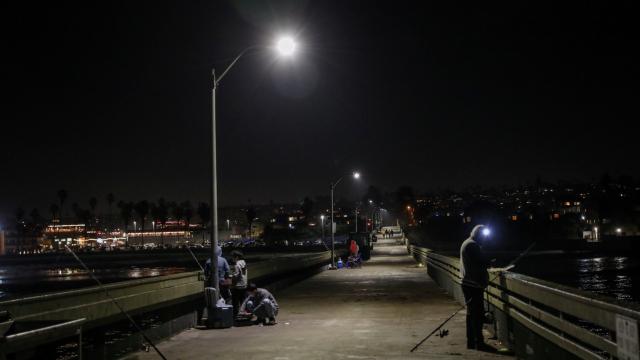You never expect a story about infrastructure to take a terrifying turn, but what’s happening in San Diego right now sounds like the setup for a dystopian cyberpunk novel. After the San Diego city council voted to nix funding for a project in which cameras attached to streetlights gather data, the mayor ordered the cameras to be shut down. But the cameras are still up — and still recording — only now the private company that owns the cameras is the only one with access to the footage.
The $US30 ($41 AUD) million program was put into place three years ago. The cameras, over 3,000 in all, were supposed to revolutionise the way the city gathered data. The plan was to make that data available to city app developers. That didn’t happen, however, according to Voices Of San Diego:
Working separately at academic institutions and private companies, local researchers and developers eager to build the types of apps the city said it wanted are finding that they can’t because the data is either flawed or unavailable. For instance, only about a dozen of the more than 3,000 sensors attached to the streetlights are producing information about passing pedestrians. It’s limited to a few sites that officials chose as a select number of sensors were brought online last fall.
Most of the sensors are capturing information about vehicles, but not all of it is useful and reliable.
“The parking data is just wrong,” said Eric Busboom, a technologist and the director of the San Diego Regional Data Library.
That’s because the data doesn’t reveal which public parking spots on the street are filled and which are unoccupied, multiple developers said. Instead, the data show how many cars are coming in and out of a given area.
The program was sold to the people of San Diego as being for data collection only. However, that all changed in 2018 when police reached out to the city’s environmental services department for the first time in order to pull footage that would assist in a murder investigation. The footage proved extremely useful and even exonerated a man wrongly arrested for the crime. The department drew up a policy limiting the use of such footage to serious crimes, as IEEE Spectrum reports, but citizen’s groups led by Genevieve Jones-Wright, then legal director of the Partnership for the Advancement of New Americans, weren’t satisfied:
Jones-Wright and her coalition argued that the lack of specific penalties for misuse of the data was unacceptable. Since September 2019 they have been pushing for a change to the city’s municipal code, that is, to codify the policy into a law enforceable by fines and other measures if violated.
But the streetlight controversy didn’t really explode until early in 2020, when another release of data from the police department indicated that the number of times video from the street lights had been used was up to 175 in the first year and a half of police department use, all in investigations of “serious” crimes. The list included murders, sexual assaults, and kidnappings — but it also included vandalism and illegal dumping, which caused activists to question the city’s definition of “serious.”
Says Jones-Wright, “When you have a system with no oversight, we can’t tell if you are operating in confines of rules you created for yourself. When you see vandalism and illegal dumping on the list — these are not serious crimes — so you have to ask why they tapped into the surveillance footage for that, and could the reason be the class of the victim. “We are concerned with the hierarchy of justice here and creating tiers of victimhood.”
The program was a civil rights nightmare that didn’t really work the way it was supposed to anyway. So over the summer, the San Diego city council blocked funding for the program, essentially cutting off Ubicquia, the company running the program, from being paid. San Diego Mayor Kevin Faulconer also ordered the cameras shut down, but while the San Diego Police Department no longer has access to the feeds, the cameras are still rolling. In fact, they can’t be shut off, as they share a power source with the light itself. So the cameras continue to record, and the only entity that has access to this footage, Ubicquia, isn’t turning them off without getting paid. From Voices again:
Emails show that staff in the Sustainability Department, which manages the streetlights program, followed through with the mayor’s order. They had AT&T deactivate the connection, so that none of the data on the devices could go to the cloud.
They also approached Ubicquia, but the company was hesitant to do any new work for San Diego until the city forked over the money it already owed. The proposed agreement with Ubicquia includes $1,050,679 for the company’s services in the last fiscal year.
In the end, Ubicquia removed the city’s credentials and cut the service layer to the devices. It was the closest the company could come to flipping an off switch without physically removing the devices around town.
“If you want us to create a software switch,” Ubicquia CEO Ian Aaron wrote to officials, “we can write custom code and deploy it. The units were not designed for this originally.”
Again, he reminded the city that they didn’t have an agreement in place.
Nicole Darling, a public information officer for the Sustainability Department, confirmed to Voice of San Diego this week that the company has yet to abide by the city’s request, meaning the cameras are still recording. But she noted the data on the devices “are encrypted and can only be decrypted by Ubicquia.”
While yes, Ubicquia deserves to get paid according to the terms of its contract, it does seem like footage of public spaces all over San Diego is being held hostage by a private firm. Totally not something to worry about, I’m sure.
